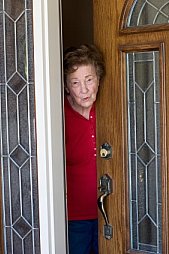Child Safety Tips:
Internet Molesters

Child safety on the Internet begins with your knowing the dangers and the safeguards.
While a 13-year-old Ossining NY girl was out of town, her mother discovered that a window screen had been cut and some items overturned. Nothing was stolen, but a teddy bear had been rearranged in her daughter's bedroom. She called police and they soon arrested 20-year-old Ricardo Brice for rape and sodomy of the girl. They had met online.
Online sex predators (of any age or sex) exploit kids’ natural
sexual curiosity and gradually seduce them with affection and gifts –
devoting great time, money, and energy. A US Department of Justice study
found that 19 percent of children on the Internet were asked to discuss
or engage in sexual activities. 15 percent were asked to talk on the
phone or meet somewhere. One third of those contacts were made despite filtering software.
For a few hundred dollars, database marketing firms will sell anyone the names, email addresses, and profiles of thousands of children in any area desired – no questions asked.
NBC's “Dateline – Predators” TV show lured hundreds of pedophiles to a home to have sex with what they thought were children they'd met online. They included married fathers, schoolteachers, a pediatrician, military officers, and even a rabbi – many of whom had driven hundreds of miles to get there – and brought alcohol and sex toys.ONLINE WARNING SIGNS
• Your child quickly changes the screen on the monitor when you come into the room.
• You find pornography on your child's computer (maybe hidden on disks).
• Your child becomes withdrawn from the family.
• Your child receives phone calls (or mail) from anyone you don't know
or is making calls to numbers you don't recognize.
IF YOU SUSPECT A MOLESTER IS TARGETING YOUR CHILD
• Openly discuss your suspicions with your child – and the dangers of sex offenders.
• Review what is on your child's computer. If you don't know how, ask
someone who does. Online sex offenders almost always meet potential
victims via chat rooms then continue to communicate by e-mail.
• Call the police if your child has received pornography or has been sexually solicited.
IMPROVE YOUR ONLINE CHILD SAFETY
• Keep the computer in a common room of the house, visible to others, not in your child's bedroom.
• Use parental controls provided by your service provider and/or blocking software, but don’t totally rely on them.
• You can take the power cord with you to work so your child can’t use the Internet unsupervised.
• Randomly check your child's online account and e-mail.
• Find out about the computer safeguards used by your child's school, library, and friends.
INSTRUCT YOUR CHILDREN ON ONLINE CHILD SAFETY
This is from the FBI library:
• Be skeptical of whatever they are told online.
• Never meet face-to-face with someone they met online unless you go with your child to meet in a public place.
• Never send pictures (or web cam images) on the Internet (nor send a picture by U.S. mail) without your OK.
• Never give out identifying information such as name, address, telephone number, or school name.
• Never download pictures from an unknown source, it may well be pornography.
• Don't open a message from anyone they don't know.
• Never respond to suggestive, obscene, or harassing messages – and tell you about it (without fear of penalty).
• Don't say things online that you shouldn't say in real life.
~~~
Software filtering programs such as Cybersitter help. However, even the best child filters allow one in five inappropriate sites to get through – and filters are powerless against chat rooms and e-mailing. Thus parental monitoring is still crucial.
Many kids use online code words: A-S-L= Age, Sex, Location; CYBER= Internet Phone Sex; P911= Parents Are Coming; Watch What You Say; CTN= Can’t Talk Now; PAN= Parents Are Nearby; PAW= Parents Are Watching; POS= Parents Over Shoulder; NP= Nosy Parents; LMIRL= Let's Meet In Real Life. TeenAngels work with police and school officials to keep up with the newest trends on how pedophiles are trying to lure kids.See SafeKids, SafeTeens, and especially ConsumerNotice: Internet Safety for Kids. Also, NeedHelpNow.ca helps teens stop the spread of sexual pictures or videos.
Also see Cyber Bullying: how to stop it FAQ.
And Check Your Neighborhood
See FamilyWatchdog.us for the registered sex offenders living in your area. But child molesters average 107 victims before their first arrest – so many won’t be shown yet. Also, sex offenders may prowl outside their neighborhood, or are homeless, or – as 24% do nationwide – assume false identities and simply "disappear."
Tools to Keep Your Kids Out of Harm's Way
Helping Survivors helps victims of sexual assault or abuse – and their families. They also teach how to be aware if a child is being groomed.
Personal Safety Devices
• Personal Security Alarm: (noisemaker or screamer). Most attackers won’t chase a noisy target. Caution - to be used with the utmost parental discretion, supervision, and attention.
• GPS Child Locator: a child tracking device. A variety of models are available. Caution - to be used with the utmost parental discretion, supervision, and attention.
Crime-Safety-Security > Child Safety Overview > Internet Safety









